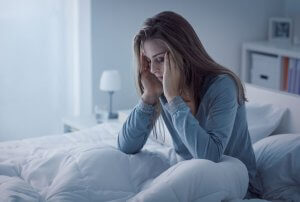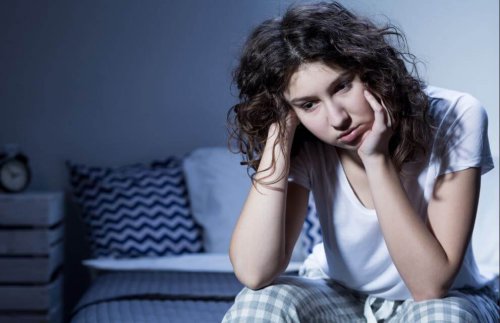The Causes of Insomnia

Insomnia is a very common sleep disorder. It’s characterized by having difficulties falling asleep when you go to bed, or it can leave you constantly waking up in the middle of the night.
Types of insomnia
Insomnia can be acute (short periods of time). This is a very common type and it’s caused by stress, traumatic events, or feeling under pressure. It usually lasts for days or even weeks.
There’s also chronic insomnia (long periods of time), which can extend for one month or more. Most cases of chronic insomnia are usually caused by other factors, such as health issues or other sleep disorders. Substances such as caffeine, tobacco and alcohol can also be the cause of chronic insomnia.

Causes of insomnia
1. Depression and anxiety. This is due to the quality of your life, physical health or an underlying psychiatric disorder. An interesting fact is that depression has increased in recent years, mostly due to social pressures within our environment.
2. Technology. The excessive use of technological devices can interfere with your ‘internal clock’ and alters the hormones that help you to fall asleep. During the last hours of each day, your body needs to slow down. So, doing intense activities and using any electronic devices before bed, will keep you awake.
3. Working at home. Not stepping away from all communication technologies is common practice among executives, which affects the quality of their sleep. Experts recommend that you respect your free time; spend it doing recreational activities and getting some rest. Having to work more hours and not taking time for yourself produces stress.
Causes related to health
4. Health problems: illnesses with chronic pain such as arthritis, headaches, asthma and heart failure, active thyroid and gastrointestinal disorders, among others, can cause or worsen insomnia.
5. Stress: experiencing too much stress or being stressed out for long periods of time causes insomnia, as well as having emotional distress. In order to reduce stress, you can try to plan out your activities and manage your time. Learn to cope with uncomfortable situations, express your emotions, and ask for help when you need it.
6. Medication: some medication can cause insomnia. Ask your doctor for alternatives that don’t affect the quality of your sleep.
7. Menopause: some solutions to improve insomnia during this time are to keep your bedroom at a low temperature so that you don’t feel uncomfortably hot through the night. Avoid sleeping pills, exercise daily, avoid caffeine and alcohol at night, and eat foods such as, cereal and milk before you go to bed.
Causes related to habits
8. Bad habits: these include sleeping during the day, exercising at night, eating heavy meals, drinking too much water or not going to bed at the same time every night. Try to do things that relax you before going to bed, such as reading a book, listening to music or taking a hot bath.
9. Drinking caffeine: caffeine is a powerful stimulant that certainly impairs sleep. It’s present in coffee, tea, soda and chocolate. Avoid it for at least six hours before your bed time. Try to also avoid alcohol, since it makes your sleep less restful.

An option to cure your insomnia without having to take pills is cognitive behavioral therapy.This consists of speaking with a therapist to analyze your ideas and feelings about sleep. The goal of this therapy is to learn how to relax and clear your mind.
There’s also a huge range of medicines that can help you to sleep. Some you must only take for a short period of time, and others you can take for longer. Ask your doctor about the benefits and possible side effects of medication that may benefit you. However, do keep in mind that many drugs can cause discomfort or be addictive.
Insomnia is a very common sleep disorder. It’s characterized by having difficulties falling asleep when you go to bed, or it can leave you constantly waking up in the middle of the night.
Types of insomnia
Insomnia can be acute (short periods of time). This is a very common type and it’s caused by stress, traumatic events, or feeling under pressure. It usually lasts for days or even weeks.
There’s also chronic insomnia (long periods of time), which can extend for one month or more. Most cases of chronic insomnia are usually caused by other factors, such as health issues or other sleep disorders. Substances such as caffeine, tobacco and alcohol can also be the cause of chronic insomnia.

Causes of insomnia
1. Depression and anxiety. This is due to the quality of your life, physical health or an underlying psychiatric disorder. An interesting fact is that depression has increased in recent years, mostly due to social pressures within our environment.
2. Technology. The excessive use of technological devices can interfere with your ‘internal clock’ and alters the hormones that help you to fall asleep. During the last hours of each day, your body needs to slow down. So, doing intense activities and using any electronic devices before bed, will keep you awake.
3. Working at home. Not stepping away from all communication technologies is common practice among executives, which affects the quality of their sleep. Experts recommend that you respect your free time; spend it doing recreational activities and getting some rest. Having to work more hours and not taking time for yourself produces stress.
Causes related to health
4. Health problems: illnesses with chronic pain such as arthritis, headaches, asthma and heart failure, active thyroid and gastrointestinal disorders, among others, can cause or worsen insomnia.
5. Stress: experiencing too much stress or being stressed out for long periods of time causes insomnia, as well as having emotional distress. In order to reduce stress, you can try to plan out your activities and manage your time. Learn to cope with uncomfortable situations, express your emotions, and ask for help when you need it.
6. Medication: some medication can cause insomnia. Ask your doctor for alternatives that don’t affect the quality of your sleep.
7. Menopause: some solutions to improve insomnia during this time are to keep your bedroom at a low temperature so that you don’t feel uncomfortably hot through the night. Avoid sleeping pills, exercise daily, avoid caffeine and alcohol at night, and eat foods such as, cereal and milk before you go to bed.
Causes related to habits
8. Bad habits: these include sleeping during the day, exercising at night, eating heavy meals, drinking too much water or not going to bed at the same time every night. Try to do things that relax you before going to bed, such as reading a book, listening to music or taking a hot bath.
9. Drinking caffeine: caffeine is a powerful stimulant that certainly impairs sleep. It’s present in coffee, tea, soda and chocolate. Avoid it for at least six hours before your bed time. Try to also avoid alcohol, since it makes your sleep less restful.

An option to cure your insomnia without having to take pills is cognitive behavioral therapy.This consists of speaking with a therapist to analyze your ideas and feelings about sleep. The goal of this therapy is to learn how to relax and clear your mind.
There’s also a huge range of medicines that can help you to sleep. Some you must only take for a short period of time, and others you can take for longer. Ask your doctor about the benefits and possible side effects of medication that may benefit you. However, do keep in mind that many drugs can cause discomfort or be addictive.
This text is provided for informational purposes only and does not replace consultation with a professional. If in doubt, consult your specialist.








